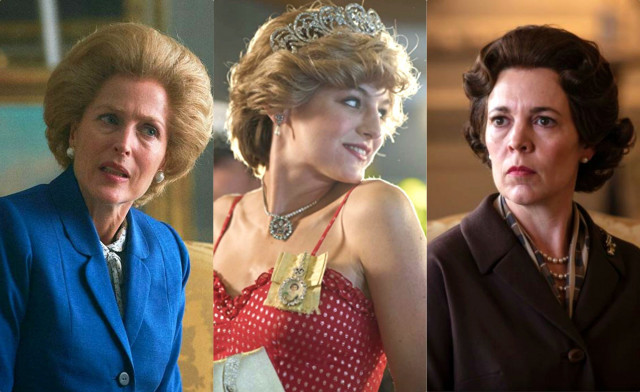Season 4 of 'The Crown' spotlights era of female leadership
Latest season is driven by reinvention of real-life drama, tragedy of protagonists and their relationships

It's the 1980s: shoulder pads, cocktail dresses and big hair celebrate their heyday, as feminism takes its uphill battle to the next level — or so it seems. The decade sets the stage for women to claim their rightful place in all strata of society, from the corporate boardroom to political chambers. But it is also a decade marked by a new brand of conservatism around the globe.
These currents and fashions also affect the British establishment, as shown in the latest season of The Crown, released on Netflix on November 15. The series portrays the world in the 80s in a state of flux, with women as the driving forces behind these changes, especially in the UK.
Coronated in 1953, the Queen has already been asserting herself not only as "Defender of the Faith" and "Queen of This Realm" per her title, but also as a woman in the modern era all along — but there is some steep competition waiting in the wings.
The dawn of Thatcherism
Since its launch in 2016, The Crown has been telling the story of the British monarchy under the leadership of Queen Elizabeth II. But the trailer of the latest season has made it amply clear that the narrative will would no longer be focused exclusively on the Queen (portrayed in seasons 3 and 4 by Olivia Colman) and her sister, Princess Margaret (played by Helena Bonham Carter), as her reluctant sidekick, as well as the Queen's marriage to Philip, the Duke of Edinburgh (played by Tobias Menzies).
Instead, there is a new political relationship that comes into focus in the latest season, as Prime Minister Margaret Thatcher (played by Gillian Anderson) takes office. In one scene, the "Iron Lady" tries to assert her seniority: Stressing that she is a few months older than the monarch, Thatcher states firmly that her primary goal is to "change the country" and not to have any sort of harmonious relationship with the Queen.
From high heels to Wellington boots
With Thatcher's election in 1979, the UK had a female prime minister for the first time in history. To this day, she continues to divide public opinion. Thatcher introduced a series of economic reforms to save the British economy from collapse, only to be met by widespread social unrest due to the country's skyrocketing unemployment.
Three people in one marriage
But Thatcher is not the only woman stealing the limelight in season 4. After a brief and much-publicised courtship, the Queen's son, Prince Charles (played by Josh O'Connor in seasons 3 and 4), marries Lady Diana Spencer in 1981. The marriage descends rather quickly for Diana from a fairytale-like happy ending to little more than a depressing nightmare. This dismays the Queen, who always places her duty to lead by example above all personal grievances.
Charles simply cannot forget his former lover, socialite Camilla Parker Bowles (portrayed by Emerald Fennell). This love triangle drives Diana to despair; over the years, she develops bulimia, trying to live up to global expectations of embodying the most beautiful woman on earth.
Diana's struggle with her self-image is highlighted early on in the fourth season. Actress Emma Corrin, who plays Diana, says it was important to her that Diana's illness was shown openly on The Crown and that her portrayal of the princess couldn't do her justice if pain wasn't shown as an integral part of the show.
Being honest about mental illness
Corrin, who was born in 1995 and says she has no personal memories of Princess Diana, is already being hailed as the newest star to come out of The Crown franchise.
"In retrospect, I think it made it easier in doing this season, to bring my own interpretation to the character, to her," Corrin had told Variety. "I had a sense of the tragedy of what had happened to her, and also I suppose her spirit that people speak of — her being this very generous, empathetic person who broke the mold of the royal family."
The tragic death of Diana is not part of season 4 of The Crown; fans of the series will likely have to wait until 2022 to see how director Stephen Daldry approaches this chapter in history.
Have something to add to the story? Share it in the comments below.



















COMMENTS
Comments are moderated and generally will be posted if they are on-topic and not abusive.
For more information, please see our Comments FAQ